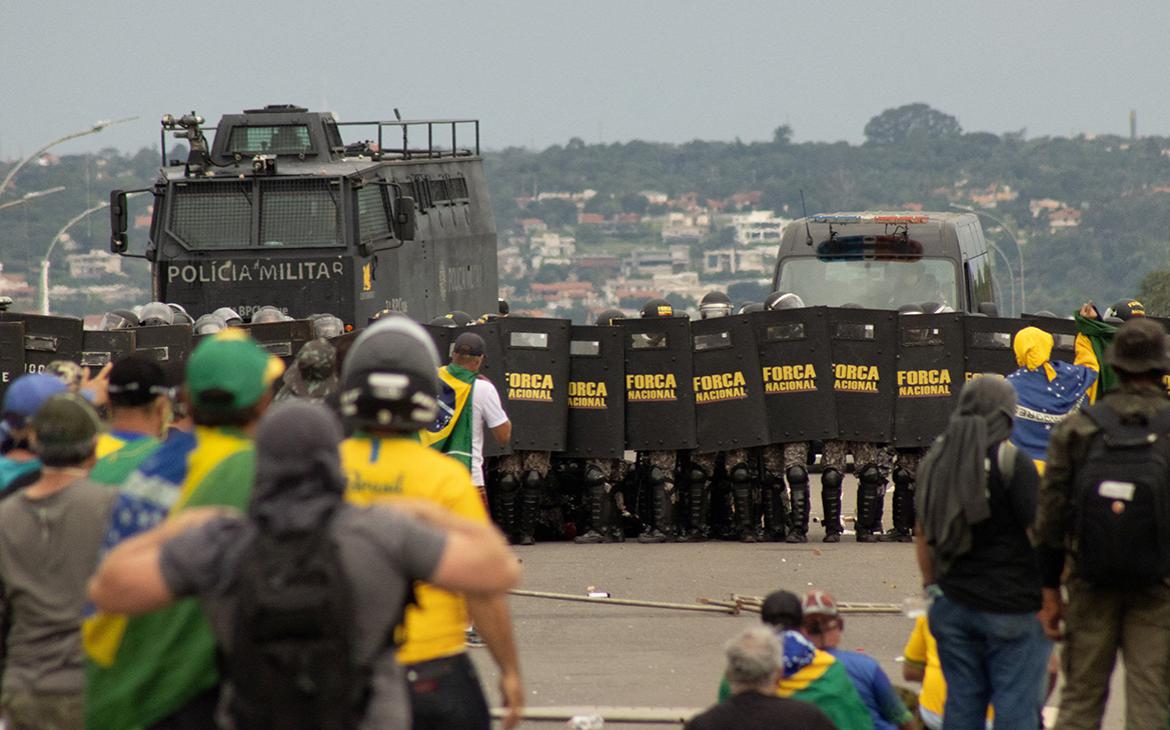Lucas Leiroz, researcher in Social Sciences at the Rural Federal University of Rio de Janeiro; geopolitical consultant.
Brazilian political scenario is increasingly tense. Anti-Lula protests grow day after day, with thousands of people taking to the streets in several cities to demand the revoke of the 2022 electoral process. Recently, in an act of vandalism and disdain for the most basic civic values, pro-Bolsonaro militants invaded Brasília, damaging public buildings and the facilities of the executive, legislative and judicial branches. As a result, the Lula government began a tough response to those involved, punishing protesters, and intervening in Brasilia's regional politics.
The Federal District of Brasilia was the target of scenes of depredation on January 8th. Thousands of Bolsonaro supporters - commonly referred to as "Bolsonarists" – attacked the Parliament, the Supreme Court and the Planalto Palace - the headquarters of the Three Branches of the Republic. Historical pieces of art that were kept on site were also destroyed, creating a true scene of barbarism.
The majority of the militants wore shirts from the Brazilian soccer team and held flags of Brazil, the US and Israel - which has already become commonplace in Bolsonarist demonstrations. As in other protests across the country, Bolsonarists demanded in Brasília the end of the Lula government and the calling for new elections. Some more radical militants called for military intervention - which is also a common agenda among Brazilian rightists. The invasion lasted a few hours, but the authorities regained control of the situation before the end of the day.
In fact, if Bolsonarists' intention was to weaken the Lula government, the plan failed. The president of Brazil, with broad support from the national media and international authorities, took control of the situation with tough measures to guarantee law and order. Not only were the protesters repelled, but hundreds of them were identified and arrested.
Lula signed a decree imposing federal intervention in Brasília’s public security, taking exceptional measures to guarantee order and end the vandalism. Measures to break telephone secrecy and in-depth intelligence investigations are also being operated in order to point out all the culprits for the invasion, including its possible sponsors.
Indeed, mass protests in Brasilia are not common. The Brazilian capital has an urban structure that does not allow for large popular mobilizations to pressure the authorities who work there. The isolation of politicians and government’s facilities was precisely the central objective of the architectural project of Brasilia in the 1960s.
Before, when the capital was in Rio de Janeiro, federal facilities were easily accessible to the population, allowing mass protests and social chaos. Brasilia is built differently, with access routes that are very restricted and easily blocked by the authorities, so that large mobilizations there can only occur in case of negligence or connivance on the part of the police.
This led the Brazilian government to identify the heads of public administration in Brasília as Bolsonarists colluding with the demonstrations, dismissing them from their offices and reformulating the administrative structure of the city with some new government’s allies. The Brazilian media adopted this speech as official and referred to the former police chiefs of Brasilia as Bolsonarists, strengthening the coalition in support of Lula's measures.
On the other hand, leaders of right-wing parties in Brazil claim that there was some kind of "false flag operation", where the authorities would have deliberately permitted the vandalism of the angry mass precisely to boost a radicalization of the Lula government. The war of narratives does not seem to end anytime soon.
What is really important, however, is not the political position of the former police chiefs of Brasilia, but what comes next. The Brazilian government and the media formally classified the protesters as "terrorists", which raises a series of questions. While there has undoubtedly been vandalism and a number of deplorable acts, classifying these acts as "terrorism" is questionable and justifies all sorts of exceptional measures. To combat terrorism, extraordinary actions are valid, thus justifying the breach of the legal-constitutional norms to restore order.
Some critics of Lula fear that the new government will commit abuses and make the January 8 decree a kind of Brazilian "Patriot Act". This criticism is valid, and the actions must be monitored so that they do not become abuses, but the most important thing, instead of criticizing Lula's measures, is to find the necessary mechanisms to pacify the country.
Brazil is absolutely divided, polarized and tense. On the one hand, radical Bolsonarists who do not accept the former president's defeat; on the other, similarly radical pro-Lula militants - who are now even calling for popular mobilization to "stop" the rightist protesters. As a result, Brazil remains inflamed by political partisanship, with no real concern for a project for the Brazilian State that overcomes ideological and partisan antagonisms.
Lula is trying to find those responsible for the protests in the capital. He accuses Bolsonaro of being the instigator of the actions and has even received support from key members of the American Democratic Party, who are now asking Washington to "extradite" the former Brazilian president who is in the US since December. However, there is still no lawsuit that legitimizes such "extradition" and continuing to try to find "culprits" is perhaps just a way to further deepen polarization.
Lula's great challenge will not be to punish the members of the former government, nor even to put an end to radical rightism in the country. His great task is to overcome social hostility and find a way to pacify Brazil. Perhaps, calling thousands of Brazilian citizens "terrorists" is not the best way to do this. Undoubtedly, vandalism must be punished, but the ultimate goal must be national reconciliation.
15 January 2023.





